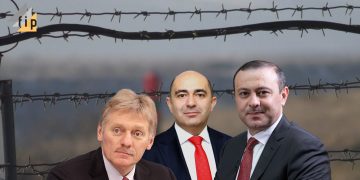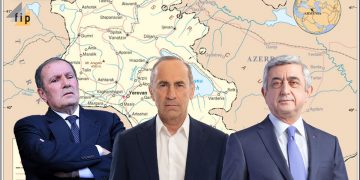During the January 12 briefing, the representative of the Ministry of Foreign Affairs of Russia, Maria Zakharova, claimed that there is no evidence of ethnic cleansing in Nagorno-Karabakh by Azerbaijan.
“As for the claims about ethnic cleansing in Karabakh, it would be desirable to see evidence. If there is at least a document by any international organization that is considered reputable in Yerevan, for example, the United Nations or any other organization… if there is at least one document or any statement that would testify that such ethnic cleansing took place, please provide us with reference to those documents,” Mrs. Zakharova said.
What is ethnic cleansing? How is it defined by the UN?
According to the United Nations, ethnic cleansing has not been recognized as a separate type of crime in international law. There is no clear definition of this concept, neither is there a specific action that would qualify as ethnic cleansing.
However, the UN Commission of Experts, which was mandated to investigate violations of international humanitarian law committed in the territory of the former Yugoslavia, defined ethnic cleansing in its interim report as “… rendering an area ethnically homogenous by using force or intimidation to remove persons of a given ethnic group from the area.”
In the final report, the Commission of Experts described ethnic cleansing as “a purposeful policy designed by one ethnic or religious group to remove by violent and terror-inspiring means the civilian population of another ethnic or religious group from certain geographic areas.”
The Commission of Experts also noted that the coercive means used to remove the civilian population include: mass murder, torture, arbitrary arrest and detention, extra-judicial executions, rape and sexual assaults, severe physical injury to civilians, confinement of civilian population in ghetto areas, forcible displacement of civilian population, deliberate military attacks or threats of attacks on civilians and civilian areas, use of civilians as human shields, destruction of personal property, attacks on hospitals, medical personnel.
Zakharova does not know that the blockade is a means of ethnic cleansing
On December 12, 2022, the Azerbaijani side blocked the Lachin Corridor, thus blocking the remaining part of Nagorno-Karabakh that is in the zone of responsibility of the Russian peacekeeping troops. In fact, as we mentioned above, the UN describes the confinement of an ethnic group in a certain area as a means of ethnic cleansing.
It is noteworthy that the Russian Foreign Ministry, including Zakharova herself, repeatedly called on Baku to unblock the Lachin Corridor, expressed concern about the violation of the rights of the civilian population as a result of the blockade, thus inadvertently stating that Baku is carrying out an act that constitutes ethnic cleansing.
By the way, earlier the Union of Informed Citizens provided a brief overview of the entire chronology of ethnic cleansing of Nagorno-Karabakh by Baku since the blockade.
Zakharova has neither seen nor heard about a number of reports and statements
There are a number of documents and statements by international courts and organizations that record the consequences of the blockade of Nagorno-Karabakh and the military attack of Azerbaijan on September 19, 2023.
For instance, on November 17, 2023, the UN International Court of Justice published its order within the framework of the Armenia vs. Azerbaijan case on the application of the International Convention on the Elimination of All Forms of Racial Discrimination, which stated that:
“According to United Nations reports, more than 100,000 persons of Armenian national or ethnic origin have found themselves compelled to leave their place of residence and reach the Armenian border since the operation commenced by Azerbaijan in Nagorno-Karabakh on 19 September 2023.”
The court also noted that: “The residents of this region have been severely impacted by the long-lasting disruption of the connection between Nagorno-Karabakh and Armenia via the Lachin Corridor, which has impeded the transfer of persons of Armenian national or ethnic origin hospitalized in Nagorno-Karabakh to medical facilities in Armenia for urgent medical care. There have also been hindrances to the importation into Nagorno-Karabakh of essential goods, causing shortages of food, medicine and other life-saving medical supplies.”
Among the international organizations, the European Parliament clearly stated in the resolution adopted on October 5, 2023 that ethnic cleansing has taken place:
Whereas ethnic cleansing is described by the UN Security Council as rendering an area ethnically homogeneous by using force or intimidation to remove from a given area persons of another ethnic or religious group and is contrary to international law; whereas there is a pressing need to stop and reverse the ongoing forced exodus of the local Armenian population, which amounts to ethnic cleansing, and to ensure the conditions for their safe return to Nagorno-Karabakh…
As regards the blockade of Nagorno-Karabakh and also the attack on the civilian population of Nagorno-Karabakh, there were several meetings of the UN Security Council, where the permanent members of the Security Council, with the exception of the Russian Federation, directly condemned and gave a name to the actions of Azerbaijan, referring to the risk of ethnic cleansing.
Note that even the absence of international documents qualifying Azerbaijan’s actions as ethnic cleansing cannot be a basis for asserting that there is no evidence of ethnic cleansing in Nagorno-Karabakh.
The Armenian media is filled with videos and other evidence proving the targeting of civilian population and infrastructure. According to the Investigative Committee of Armenia, as a result of the actions by Azerbaijan, 223 people were killed, of which 25 were civilians, and 5 of them were minors.
Thus, Maria Zakharova questions ethnic cleansing in Nagorno-Karabakh by Baku with false claims that there is no evidence or statements and documents by international organizations about ethnic cleansing.
Nane Manasyan

 FACTOMETER
FACTOMETER










